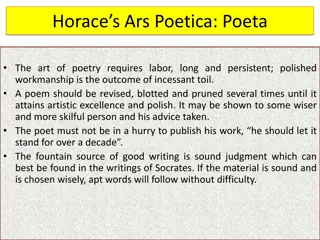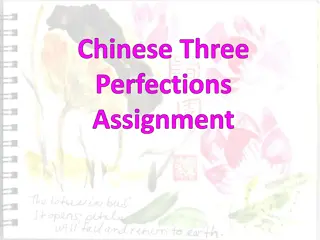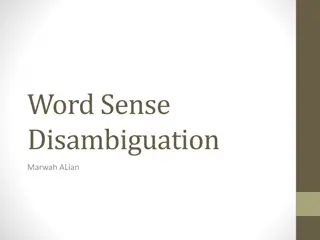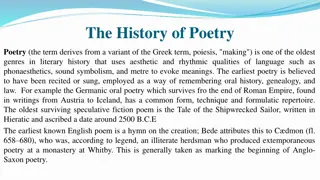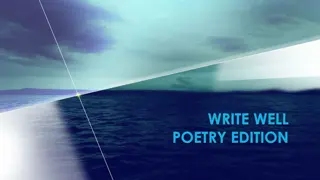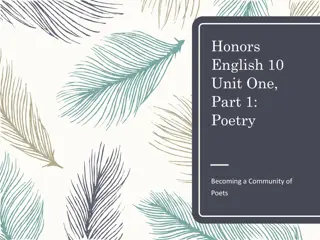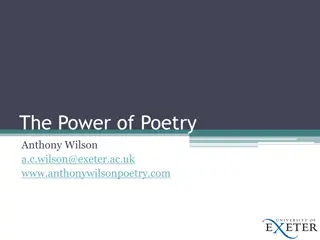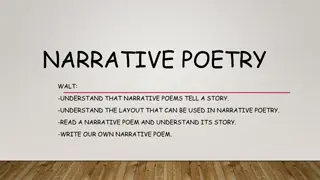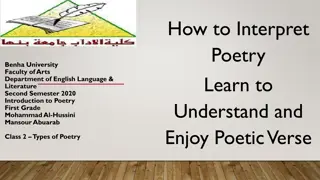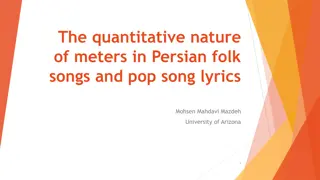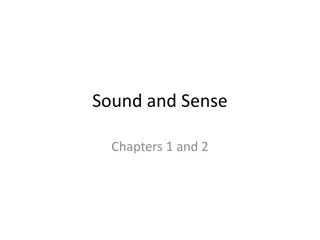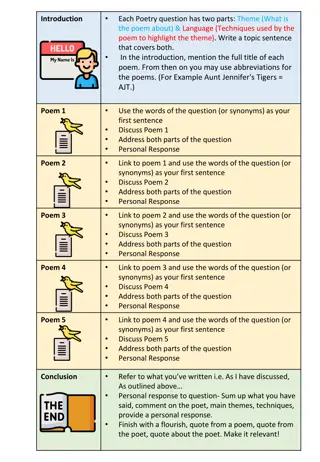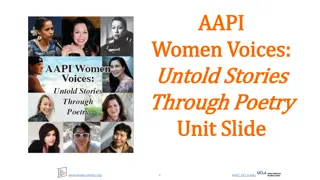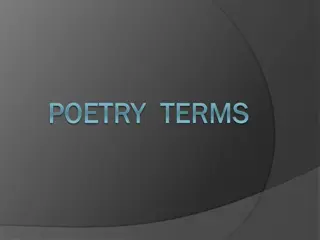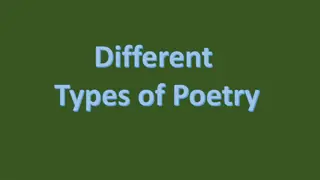Introduction to Poetry Analysis: Techniques and Approaches" (66 characters)
Delve into the world of poetry analysis with key insights on understanding the poet's craft, approaching unseen poems confidently, and identifying literary devices to unravel thematic content. Explore how to analyze poems effectively using the ART WARS framework and break free from common misconceptions about poetry. Gain a deeper appreciation for the spontaneous overflow of powerful feelings captured in tranquility, as professed by William Wordsworth. Discover the beauty and complexity of poetry as you explore tone, voice, point of view, and more in this enlightening session. (499 characters)
Download Presentation

Please find below an Image/Link to download the presentation.
The content on the website is provided AS IS for your information and personal use only. It may not be sold, licensed, or shared on other websites without obtaining consent from the author. Download presentation by click this link. If you encounter any issues during the download, it is possible that the publisher has removed the file from their server.
E N D
Presentation Transcript
UGRC 160 UGRC 160 Introduction to Introduction to Literature Literature SESSION 7
Poetry Poetry - -An Introduction An Introduction- - Tone, Voice, Point of View Tone, Voice, Point of View
Session Objectives Session Objectives At the end of the session, the student will 1.Understand the poet s craft and how poetry functions 2.Be able to approach an unseen poem with some level of confidence. 3.Learn the techniques in identifying and connecting figurative/literary devices to thematic content or subject matter of the poem.
POETRY POETRY What is Poetry? Have you ever written a poem?
Poetry is the spontaneous overflow of powerful feelings recollected in tranquility. (William Wordsworth)
How to Analyze a Poem How to Analyze a Poem First of all, PLEASE GET RID OF THE IDEA THAT POETRY IS: Boring
Scary Difficult to Understand
Analyzing a Poem- Lets Use ART WARS A- About Finding out what the poem is about, after a first or second reading is useful in interpreting what the poem is about. Eg. Love, Betrayal, War, etc. R- Repeated Ideas Identifying the Repeated Ideas in the poem is useful in establishing an interpretation of the poem. T- Tone What is the Tone of the poem? What emotion do the words in the poem suggest? Eg. Anger, Frustration, Pity etc. W- Words (Diction) A careful/close-reading of the poem helps to establish an interpretation, as the reader looks for the denotative and connotative meanings of words and establishes some relationship between the words in the poem. A- Alliteration Identifying sound devices such as Alliteration and other figurative devices in the poem is useful in establishing an interpretation. R- Rhyme and rhythm Do the lines of the poem rhyme? Is there a consistent rhyme pattern or is the rhyme inconsistent? The presence or absence of a rhyme pattern can sometimes be linked to the poet s message in the poem S- Structure Does the poem have an identifiable structure? Is it organized in Stanzas? Are the stanzas of ordinate length? Finding answers to these questions may help to establish an interpretation of the poem. For instance, a poem may de divided into stanzas where the short stanzas are about moments of joy and the longer stanzas about pain and sorrow. This may suggest that life is constituted of brief moments of joy and longer periods of pain. ART WARS
How about a round of applause A standing ovation This just looks like a re-run But you put on quite a show Curtains finally closing That was quite a show Very entertaining But it s over now And the award for the best liar goes to you Let s hear your speech now Rihanna, Take a Bow In this excerpt of Verse, the highlighted sections seem to suggest a particular Repeated idea. The idea of Theatre/Performance seems to be repeated or recurs in the Verse. This may suggest that whatever relationship the persona had with the addressee was just a performance. It was not real, just like a performance on a stage/theater.
Id catch a grenade for you Throw my hand on a blade for you I d jump in front of a train for you You know I d do anything for you I would go through all this pain Take a bullet straight through my brain Yes, I would die for you baby, But you won t do the same. Bruno Mars, Grenade Similarly, in this excerpt of Verse, the Repeated Ideas: grenade, throw, blade, pain, bullet and die, seem to convey VIOLENCE AND PAIN. Thus, we can infer that the persona s relationship with the addressee is perhaps a violent one or full of struggle and strife. Also, whereas the persona is willing to endure all forms of fatal scenarios for the addressee, he/she is unwilling to do same.
The Negro Speaks of Rivers by Langston Hughes
After studying Langston Hughes poem The Negro Speaks of Rivers, what do you think is: The Tone of the Persona? The Point of View/ Voice What does the poet s use of the I persona contribute to the interpretation of the poem? Can you identify any Repeated Ideas in the poem? Eg. The repetition of the line I ve Known rivers .




